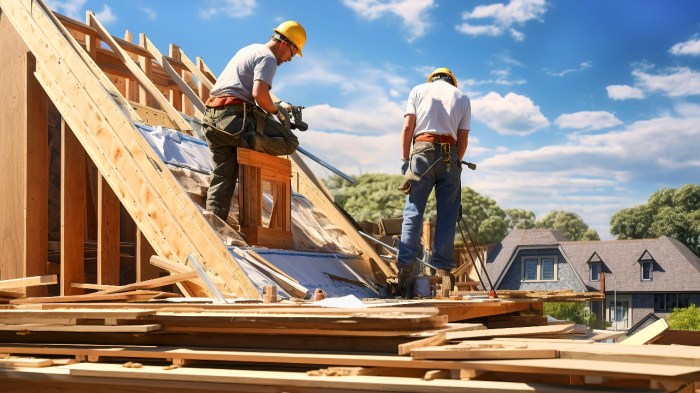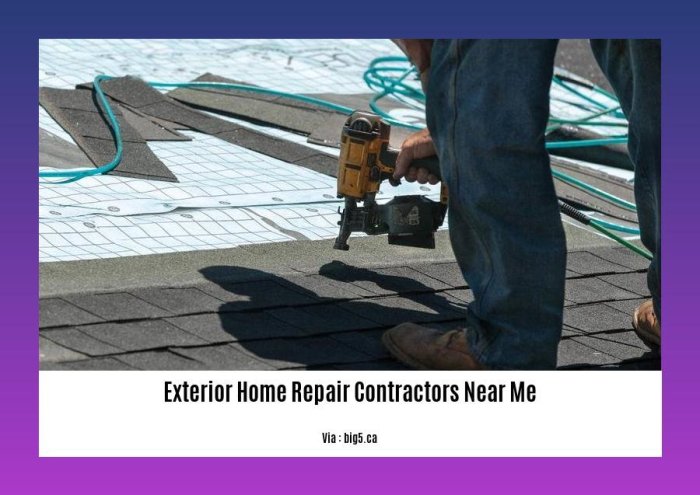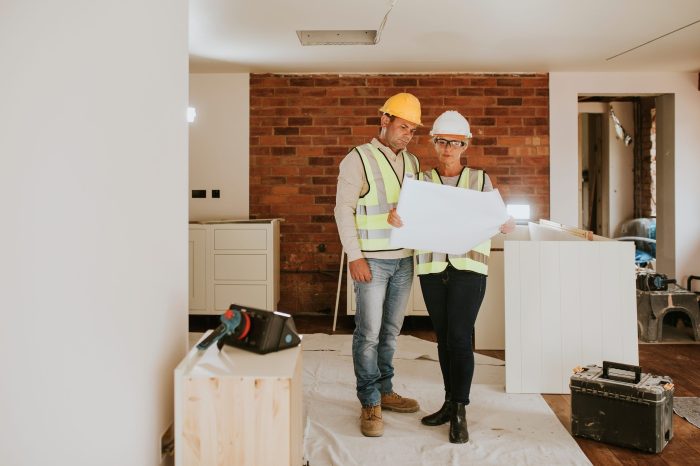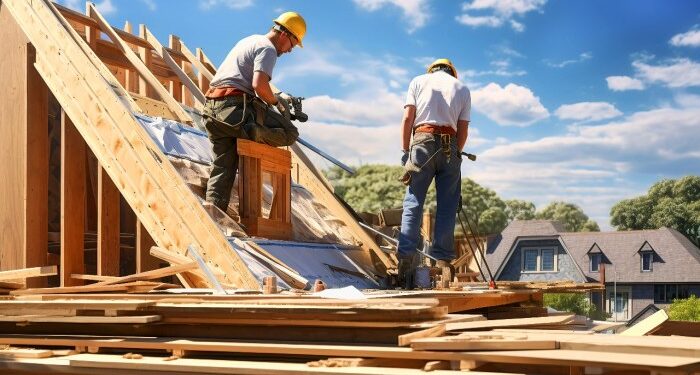Exterior Home Improvement Contractors Near Me: 10 Questions to Ask sets the stage for this informative discussion, providing valuable insights into finding the right contractors for your home improvement needs. From researching reputable contractors to navigating through permits and regulations, this comprehensive guide covers all essential aspects to consider when embarking on an exterior home improvement project.
Researching Contractors
When looking for reputable exterior home improvement contractors in your area, it's essential to do thorough research to ensure you hire a reliable and skilled professional for the job. Here are some tips to help you find the right contractor for your project:
Reading Reviews and Checking References
Reading reviews from previous clients can give you valuable insight into the contractor's work quality, reliability, and professionalism. Look for patterns in the reviews and pay attention to any red flags. Additionally, ask the contractor for references from past projects and take the time to follow up with these references to get a better understanding of the contractor's track record.
Verifying Licenses and Insurance
Before hiring a contractor, it's crucial to verify that they have the necessary licenses and insurance to perform the work legally and safely. A licensed contractor has met specific requirements and regulations set by the state, ensuring that they are qualified to do the job.
Insurance, on the other hand, protects you as the homeowner in case of accidents or damages during the project. Always ask to see proof of licenses and insurance before signing any contracts.
Services Offered
When looking for exterior home improvement contractors, it's important to understand the various services they offer. These professionals can help enhance the curb appeal, functionality, and value of your home through a range of services.
Roofing
Roofing services involve the installation, repair, or replacement of your roof. This is essential for protecting your home from the elements and ensuring structural integrity. Common roofing materials include asphalt shingles, metal, and tile. A reputable contractor will assess your roof's condition and recommend the best solution.
Siding
Siding services focus on the exterior walls of your home. Contractors can install, repair, or replace siding to improve insulation, weather resistance, and aesthetics. Popular siding materials include vinyl, wood, fiber cement, and stucco. The right choice depends on your budget, maintenance preferences, and desired look.
Painting
Exterior painting can transform the appearance of your home and protect it from moisture and UV damage. Contractors can help you choose the right paint colors, finishes, and techniques for a durable and visually appealing result. Proper preparation and application are key to a long-lasting paint job.
Landscaping
Landscaping services cover a wide range of outdoor improvements, such as lawn care, hardscaping, and garden design. Contractors can create outdoor living spaces, enhance curb appeal, and improve drainage and irrigation systems. Landscaping can complement other exterior renovations and boost your home's overall appeal.Determining which services are essential for your home improvement needs depends on factors like your budget, priorities, and long-term goals.
Consult with a reputable contractor to assess your home, discuss your objectives, and create a customized plan that addresses your specific requirements.
Cost Estimation

When it comes to exterior home improvement projects, accurate cost estimation is crucial to stay within budget and avoid any financial surprises along the way. By understanding how to obtain precise cost estimates, recognizing factors that can influence project costs, and learning tips for budgeting and negotiating with contractors, you can ensure a smooth and cost-effective renovation experience.
Methods for Obtaining Accurate Cost Estimates
- Get multiple quotes from different contractors to compare prices and services offered.
- Provide detailed project requirements and specifications to each contractor for a more accurate estimate.
- Ask for a breakdown of costs, including materials, labor, permits, and any additional fees.
- Consider hiring a professional estimator to assess the project and provide a detailed cost analysis.
Factors Influencing Project Costs
- The size and scope of the project, including the materials and labor required.
- The current condition of the exterior, as repairs or replacements may be needed.
- The location of the property, which can affect labor costs and material availability.
- Seasonal factors, such as demand and weather conditions, may impact pricing.
Tips for Budgeting and Negotiating
- Set a realistic budget based on your priorities and the estimated costs of the project.
- Discuss payment options and schedules with contractors to ensure financial feasibility.
- Be open to negotiation, but also consider the quality of work and reputation of the contractor.
- Avoid making hasty decisions based solely on price, as quality and reliability are essential factors to consider.
Timelines and Deadlines
When embarking on a home improvement project, establishing realistic timelines and deadlines is crucial for its successful completion. It ensures that the project stays on track and is completed in a timely manner. Here are some tips on how to set and adhere to timelines and deadlines for your exterior home improvement project.
Setting Realistic Timelines
- Begin by discussing the project scope and timeline with your contractor before starting any work. Make sure both parties are clear on the expected timeline for completion.
- Consider factors such as weather conditions, material availability, and the complexity of the project when setting deadlines. Be realistic about how long each phase of the project will take.
- Factor in buffer time for unexpected delays or changes that may arise during the course of the project. This will help prevent frustration and ensure that the project stays on schedule.
Adhering to Agreed-upon Timelines
- Communicate regularly with your contractor to track progress and address any potential delays early on. Open communication is key to ensuring that the project stays on schedule.
- Hold regular check-ins or meetings to discuss any challenges or changes to the timeline. By staying proactive, you can address issues before they escalate and impact the overall timeline.
- Establish clear consequences for missed deadlines in the contract to incentivize contractors to adhere to the agreed-upon timelines. This can help keep the project on track and ensure accountability.
Setting Clear Deadlines for Project Phases
- Break down the project into distinct phases and set clear deadlines for each phase. This will help you track progress and ensure that each stage is completed on time.
- Define milestones for each phase of the project to measure progress and ensure that the project is moving forward according to plan. This will help you identify any potential delays early on and take corrective action.
- Work with your contractor to establish realistic deadlines for each phase based on the scope of work and complexity involved. By setting clear deadlines, you can maintain control over the project timeline and ensure timely completion.
Material Selection

When it comes to exterior home improvement projects, selecting high-quality materials is crucial for the overall success and longevity of the project. The materials you choose can impact the appearance, durability, and maintenance requirements of your home.
Choosing Durable and Suitable Materials
- Consider the climate in your area when choosing materials. For example, if you live in a region with harsh weather conditions, opt for materials that are known for their durability and resistance to elements.
- Research the different material options available for your project and select ones that are known for their longevity. This will help ensure that your investment lasts for years to come.
- Consult with your contractor to get recommendations on materials that are suitable for your specific project and location. They can provide valuable insight based on their experience and expertise.
Comparing Material Options
- Compare the cost of different materials to ensure that they fit within your budget. Keep in mind that while some materials may have a higher upfront cost, they may require less maintenance and repair in the long run.
- Look into the maintenance requirements of each material option. Some materials may require regular upkeep, while others are more low-maintenance.
- Consider the aesthetic appeal of the materials and how they will complement the overall look of your home. Choose materials that not only meet your functional needs but also enhance the curb appeal of your property.
Permits and Regulations
When it comes to exterior home improvement projects, obtaining the necessary permits is crucial to ensure that your renovations are legal and up to code. Failure to obtain the required permits can result in fines, delays, or even having to undo completed work.
Importance of Permits
Obtaining permits for your exterior home improvement projects is essential to ensure that the work meets safety standards and building codes. Permits also provide a level of protection for both you as the homeowner and your contractor, ensuring that the project is completed correctly and up to standard.
Common Regulations
- Building Codes: Different areas have specific building codes that dictate the materials, methods, and standards that must be followed during construction or renovation projects.
- Zoning Regulations: Zoning laws regulate land use, including where structures can be built, how they can be used, and how far they must be set back from property lines.
- Historic District Regulations: If your home is located in a historic district, there may be additional regulations governing what changes you can make to the exterior of your home.
Ensuring Compliance
- Check Local Requirements: Research the permit requirements and regulations specific to your area before starting your project.
- Discuss with Your Contractor: Make sure your contractor is aware of and understands the necessary permits and regulations. A reputable contractor will handle the permit process for you.
- Inspections: Be prepared for inspections throughout the project to ensure that the work is being done according to code.
Communication with Contractors
Effective communication with exterior home improvement contractors is crucial for the success of your project. Here are some strategies to ensure smooth collaboration throughout the renovation process.
Regular Updates and Feedback
- Establish regular check-in meetings with the contractor to discuss progress, any issues, and to provide feedback.
- Encourage open communication to address any concerns promptly and prevent misunderstandings.
- Request updates on the project timeline, budget, and any changes to the initial plan.
Addressing Concerns and Issues
- If any issues arise during the renovation, address them immediately with the contractor.
- Clearly communicate your concerns and work together to find solutions that meet your expectations.
- Document any changes or agreements in writing to avoid miscommunication or disputes later on.
Warranty and Guarantee
When hiring exterior home improvement contractors, it is crucial to consider the warranties and guarantees they offer for their work. These protections can provide you with peace of mind and ensure that your investment is safeguarded. Here are some key points to consider when evaluating warranty terms and conditions:
Significance of Warranties and Guarantees
Warranties and guarantees offered by contractors serve as a promise of quality and durability for the work they perform on your home. They provide assurance that the contractor will stand behind their work and address any issues that may arise after the project is completed.
This can give you confidence in the contractor's expertise and commitment to customer satisfaction.
What to Look for in Warranty Terms and Conditions
- Duration: Ensure that the warranty period is clearly stated and covers a sufficient length of time to address any potential issues that may arise.
- Coverage: Review what aspects of the project are covered under the warranty, including materials, workmanship, and structural integrity.
- Exclusions: Pay attention to any exclusions or limitations Artikeld in the warranty, as they may impact the extent of coverage provided.
- Transferability: Check if the warranty is transferable to a new homeowner if you decide to sell your property, as this can add value to your home.
Tips for Ensuring a Protective Warranty
- Get it in writing: Make sure that the warranty terms and conditions are clearly Artikeld in a written contract before work begins.
- Ask questions: Don't hesitate to ask the contractor for clarification on any aspects of the warranty that you do not understand.
- Research the contractor: Look into the contractor's reputation and past projects to gauge their reliability and trustworthiness in honoring warranties.
- Maintain records: Keep all documentation related to the project, including contracts, receipts, and warranty information, in case you need to reference it in the future.
Safety Measures
Ensuring safety during exterior home improvement projects is crucial for the well-being of both contractors and residents. Implementing key safety measures can help prevent accidents and injuries on the job site. In case of emergencies or safety hazards, knowing what to do can make a difference in minimizing risks and ensuring a swift response.
Key Safety Measures
- Provide proper personal protective equipment (PPE) for all workers, including helmets, gloves, safety goggles, and harnesses.
- Secure the work area by setting up barricades, warning signs, and safety cones to prevent unauthorized access.
- Regularly inspect and maintain tools and equipment to ensure they are in good working condition.
- Establish clear communication channels and emergency protocols to address potential hazards or accidents promptly.
- Train all workers on safety procedures, including how to handle emergencies such as fires, electrical hazards, or injuries.
Project Completion and Inspection

After the exterior home improvement project is completed, it is crucial to inspect the work thoroughly to ensure quality craftsmanship and adherence to the agreed-upon specifications. This final inspection is a critical step in the process to address any deficiencies or issues before finalizing the project.
Steps for Inspecting the Completed Project
- Conduct a visual inspection of all areas of the exterior that were worked on, paying attention to details like finish quality, alignment, and overall appearance.
- Test functionality of any installations or systems, such as doors, windows, or roofing, to ensure they are working correctly.
- Check for any signs of damage or incomplete work that may need to be addressed before finalizing the project.
Importance of Conducting a Final Walkthrough
- A final walkthrough with the contractor allows for any final adjustments or corrections to be made before the project is considered complete.
- This is an opportunity to address any concerns or questions about the work done and ensure that both parties are satisfied with the outcome.
- It provides a chance to confirm that all work has been completed according to the contract and to the homeowner's expectations.
Tips for Addressing Deficiencies or Issues
- Document any deficiencies or issues found during the inspection and discuss them with the contractor for resolution.
- Clearly communicate your concerns and expectations for the necessary corrections or improvements to be made.
- Ensure that all agreed-upon changes or fixes are completed to your satisfaction before finalizing the project.
Conclusive Thoughts
In conclusion, Exterior Home Improvement Contractors Near Me: 10 Questions to Ask equips you with the knowledge and tools necessary to make informed decisions when hiring contractors for your next home improvement project. By asking the right questions and staying informed throughout the process, you can ensure that your project is completed to your satisfaction and within budget.
FAQ Summary
How can I research and find reputable exterior home improvement contractors in my area?
You can start by asking for recommendations from friends and family, checking online reviews, and verifying licenses and insurance before hiring a contractor.
What are some common exterior home improvement services offered by contractors?
Common services include roofing, siding, painting, landscaping, and more.
How can I obtain accurate cost estimates from contractors?
You can request quotes from multiple contractors, consider factors that influence costs, and negotiate prices to stay within your budget.
Why is it important to choose high-quality materials for exterior home improvement projects?
High-quality materials ensure durability and longevity, making your investment worthwhile in the long run.
What are key safety measures that should be in place during exterior home improvement projects?
Ensuring a safe working environment, following safety protocols, and being prepared for emergencies are essential safety measures to consider.














